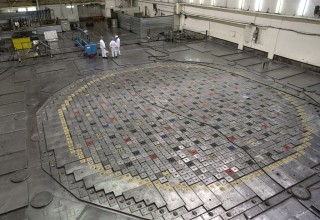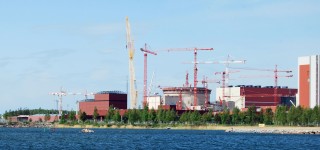
New Managing Director for Bellona Norway
The Board of the Bellona Foundation has appointed former Minister of Climate and the Environment Sveinung Rotevatn as Managing Director of Bellona No...
News

Publish date: January 27, 2015
News
A report by the Russian Duma’s independent Audit Chamber seen by Bellona revealed that delayed payments for construction costs at a host of new nuclear power plant builds are leading to ballooning budgets, delayed start up dates and sloppy, hazardous construction conditions.
The report also hinted circuitously that these delays in new projects meant to replace aged and less reliable reactors could lead to new dangers.
The Audit Chamber report (in Russian) outlined that funding was being “unequally” distributed to Russian reactor projects by Rosenergoatom, the state nuclear corporation Rosatom’s nuclear utility.
The report also citied delays of up to 76 days for funding to wend its way from Rosatom to Atomenergoprom, Rosatom’s holding company for civilian nuclear power assets. Overall, the constricted funding flow has put seven of nine new Russian nuclear power plant builds behind schedule, said the report.
Primarily impacted by the slow payments are construction projects at the Leningrad-2, Novovoronezh-2 and Beloyarsk nuclear power plants, which the report surmised would lead to construction delays of 12 to 38 months, and “lead to more expensive projects.”

The Audit Chamber said Russia provided 184.8 billion rubles (or $2.85 billion) worth of state funding between the years 2011 and 2013 for nuclear power plant construction, a budget the report suggests is unrealistic.
Specifically, the report’s lead auditor, Valery Bogomolov told the Audit Chamber that the tempo of work farmed out to Rosatom subcontractors was “unsatisfactory.”
This has caused a backlog of construction at plants throughout Russia during the 2011 to 2013 period, with a spike in cost of some 342 billion rubles ($5.1 billion), leading to spiraling construction costs across the board, the report said.
In the case of the Leningrad Nuclear Power Plant-2, this has led to construction deadline pushbacks for the plant’s first reactor from 2013 to 2015 and from 2014 to 2017 for it’s second reactor. Equipment installation costs are expected to rise by 4 billion rubles ($60 million).
Absent environmental reviews and collapsing walls
The report’s chief auditor, Valery Bogomolov, further reported that this construction is taking place in the absence of a passing review by Russia’s Directorate-General for State Environmental Reviews.
Further, said Bogomolov, construction at the Leningrad-2 station lacks a synchronized schedule of equipment delivery and installation, meaning that some 6.7 billion rubles of equipment will no longer – by the time it comes online – be covered by manufacturers’ warranties.
The plodding progress has seen some dangerous developments. Technical violations in construction of the Leningrad-2 plant’s No 1 reactor resulted in a collapse of the unit’s reinforcement cages, which brought down the reactor’s outer protective shell July 2011. The construction of the No 1 and 2 units were delayed by a year as a result, which could result in a 45 million-ruble increase.
Bogomolov further cited poorly coordinated efforts between Rosatom and Russia’s Ministry of Energy to supply needed power to build the Leningrad Plant-2’s No 3 and 4 reactors, which will result in further delays.
The “poor-quality communication,” as it was called in the Audit, between Rosatom and the Energy Ministry is all the more embarrassing as the Leningrad-2 station is going up adjacent to the original Leningrad Nuclear Power Plant, which should have resulted in an uninterrupted energy flow.
But the delay poses real dangers: Because these two units will come online late, continued operation of the original Leningrad Nuclear Power Plant’s Chernobyl-style reactors could be prolonged, the Audit Chamber said.
In 2013, swelling and cracking in the graphite moderator of one of those reactors caused it to shut down. Environmentalists hoped it would remain down for good, but Rosenergoatom repairs had it back on the grid by December of that year.
Rosatom, in responses to the Audit Chamber reported by World Nuclear News, said it’s doing its best to commission reactors 3 and 4 at Leningrad-2 in tandem with decommissioning the RMBKs at the first Leningrad Nuclear plant.
New reactors will cost more when decommissioning prices are reckoned
“This report from the Russian audit chamber just once more underline the building a nuclear reactor as a rule are delayed and more expensive than planned,” Nils Bøhmer, Bellona’s executive director and nuclear physicist said. He cited immense cost overruns at France and Finland’s EPR reactors, both of which are expected to surpass $11 billion. Both were originally slated to cost about $3 billion. Now, said Bøhmer, ”We’re seeing overruns in Russia as well.”

Bøhmer added that decommissioning expenses for the new reactors in Russia – which can only be determined by guesswork – would only add to thier overall cost.
“This shows that there are a lot of hidden costs in nuclear electricity that society in the end has to pay,” he said.
Rosatom defended the rising price tag in remarks reported by WNN, saying it “always emphasized” that changes to construction works at nuclear power plants may lead to a rise in costs.
Rosatom said all construction shifts had been approved by the Russian government, and that some of the deadlines had been delayed because of government forecasted drops in energy consumption, WNN reported.
The corporation also indicated that the Leningrad-2 and Novovoronezh-2 include the construction of its new AES-2006 reactor design, which necessitate “additional controls to all the processes involved in these projects to ensure such future reactors will be constructed safely, on time and to budget.”
Beloyarsk No 4’s fast neutron reactor, Rosatom told WWN, isn’t analogous to any other nuclear project in the world.

The Board of the Bellona Foundation has appointed former Minister of Climate and the Environment Sveinung Rotevatn as Managing Director of Bellona No...

Økokrim, Norway’s authority for investigating and prosecuting economic and environmental crime, has imposed a record fine on Equinor following a comp...

Our op-ed originally appeared in The Moscow Times. For more than three decades, Russia has been burdened with the remains of the Soviet ...

The United Nation’s COP30 global climate negotiations in Belém, Brazil ended this weekend with a watered-down resolution that failed to halt deforest...